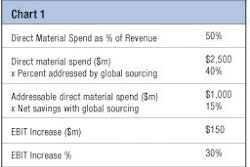New York — November 16, 2006 — Suppliers of perishable goods ranging from bananas to oncology drugs may soon have a cost-effective, real-time method to potentially reduce an estimated $35 billion in annual U.S. waste in the supply chain by applying emerging technologies to monitor and control conditions in the so-called "cold chain," according to Deloitte Consulting and the RFID Research Center at the University of Arkansas, which are developing methodologies for applying the technologies.
The joint in-transit study by Deloitte and the research center, made possible by Chiquita Brands International, found broad inconsistencies in temperature within environmentally controlled trailers used in the distribution chain for perishable goods.
"Loss and damage of perishable goods during storage and transportation is a substantial global issue, with some industry sources estimating that losses of up to 33 percent on perishable freight are common," said Doug Standley of Deloitte Consulting. "In addition to negatively impacting manufacturers' and distributors' financial results, these losses contribute to waste, pollution, inefficient utilization of resources and illnesses caused by poor handling."
Toward the Intelligent Cold Chain
Standley said that when such adverse events as unacceptable temperature changes occur, being able to quickly alert all parties and take remedial action can provide real value and go a long way toward resolving the issue. "The good news is that emerging technologies are now ready to address this issue," Standley added. "We believe that, through our advanced cold chain research and experience, we have developed an economically feasible solution for manufacturers and distributors."
The research confirmed that the temperature within a shipping container can vary up to 35 percent from pallet to pallet, creating a potentially unacceptable environment for perishable goods.
"Our research, which utilized emerging wireless, sensor and Internet applications, was able to monitor and control temperatures and provide sufficient tracking to ensure item-level quality," said Bruce Westbrook, leader of the Consumer Business Consulting practice for Deloitte & Touche USA. "The research leveraged these technologies without specific vendor bias to develop a neutral 'intelligent cold chain' perspective that can serve the global supply chain marketplace."
"This project showed that wireless and sensory technologies are a reliable, cost-effective way to investigate temperature and other conditions within a supposedly environmentally controlled trailer," said Bill Hardgrave, director of the UA RFID Research Center. "The preliminary data from the experiment are already beginning to provide insight into a 'real world' environment that until now had been prohibitively expensive to track. Overall, this project — even at this early stage — is rapidly bringing into focus the vision of a truly intelligent cold chain."
Solution Appeals to Chiquita
Deloitte Consulting and University of Arkansas collaborated with Chiquita Brands International for a real-world application of the research; Chiquita provided refrigerated trucks and perishable products from its live supply chain.
"We have a long tradition, dating back to 1903 when we first introduced the use of refrigerated cargo ships to transport bananas, as leaders in innovative cold-chain management," said Waheed Zaman, Chiquita's senior vice president of supply chain and procurement. "Our decision to actively participate in this study was driven by our continued desire to optimize the quality and freshness of our healthy foods for consumers and customers. The insights gained, along with our application of emerging technologies, will offer us opportunities to continue to excel in cold-chain management and drive consumer-impacting advancements."
Deloitte Consulting and the University of Arkansas are publishing opinion and analysis papers on cold chain applications for wireless sensor systems. Deloitte Consulting is a strategic sponsor of the University of Arkansas RFID Research Center.
The UA RFID Research Center is a subunit of the Information Technology Research Institute within the Sam M. Walton College of Business. The center, which officially opened in June 2005, is one of the first EPC/RFID research laboratories worldwide to receive the EPCglobal Performance Test Center accreditation.
The joint in-transit study by Deloitte and the research center, made possible by Chiquita Brands International, found broad inconsistencies in temperature within environmentally controlled trailers used in the distribution chain for perishable goods.
"Loss and damage of perishable goods during storage and transportation is a substantial global issue, with some industry sources estimating that losses of up to 33 percent on perishable freight are common," said Doug Standley of Deloitte Consulting. "In addition to negatively impacting manufacturers' and distributors' financial results, these losses contribute to waste, pollution, inefficient utilization of resources and illnesses caused by poor handling."
Toward the Intelligent Cold Chain
Standley said that when such adverse events as unacceptable temperature changes occur, being able to quickly alert all parties and take remedial action can provide real value and go a long way toward resolving the issue. "The good news is that emerging technologies are now ready to address this issue," Standley added. "We believe that, through our advanced cold chain research and experience, we have developed an economically feasible solution for manufacturers and distributors."
The research confirmed that the temperature within a shipping container can vary up to 35 percent from pallet to pallet, creating a potentially unacceptable environment for perishable goods.
"Our research, which utilized emerging wireless, sensor and Internet applications, was able to monitor and control temperatures and provide sufficient tracking to ensure item-level quality," said Bruce Westbrook, leader of the Consumer Business Consulting practice for Deloitte & Touche USA. "The research leveraged these technologies without specific vendor bias to develop a neutral 'intelligent cold chain' perspective that can serve the global supply chain marketplace."
"This project showed that wireless and sensory technologies are a reliable, cost-effective way to investigate temperature and other conditions within a supposedly environmentally controlled trailer," said Bill Hardgrave, director of the UA RFID Research Center. "The preliminary data from the experiment are already beginning to provide insight into a 'real world' environment that until now had been prohibitively expensive to track. Overall, this project — even at this early stage — is rapidly bringing into focus the vision of a truly intelligent cold chain."
Solution Appeals to Chiquita
Deloitte Consulting and University of Arkansas collaborated with Chiquita Brands International for a real-world application of the research; Chiquita provided refrigerated trucks and perishable products from its live supply chain.
"We have a long tradition, dating back to 1903 when we first introduced the use of refrigerated cargo ships to transport bananas, as leaders in innovative cold-chain management," said Waheed Zaman, Chiquita's senior vice president of supply chain and procurement. "Our decision to actively participate in this study was driven by our continued desire to optimize the quality and freshness of our healthy foods for consumers and customers. The insights gained, along with our application of emerging technologies, will offer us opportunities to continue to excel in cold-chain management and drive consumer-impacting advancements."
Deloitte Consulting and the University of Arkansas are publishing opinion and analysis papers on cold chain applications for wireless sensor systems. Deloitte Consulting is a strategic sponsor of the University of Arkansas RFID Research Center.
The UA RFID Research Center is a subunit of the Information Technology Research Institute within the Sam M. Walton College of Business. The center, which officially opened in June 2005, is one of the first EPC/RFID research laboratories worldwide to receive the EPCglobal Performance Test Center accreditation.









